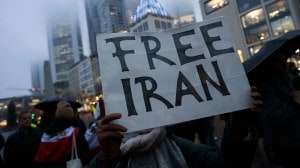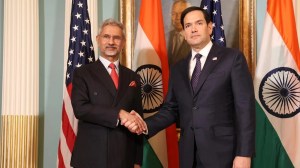National interest
For the General goodPlease do pause for a moment and think of the implications of the peculiar mindset where the question many of us ask i...

For the General good
Please do pause for a moment and think of the implications of the peculiar mindset where the question many of us ask is not whether Bill Clinton is visiting India or not, but whether he will stop over in Pakistan on his way or not. We accuse the Americans for following all kinds of irrational principles in relating to the subcontinent over the past decades the zero sum game, two-country rule, et cetera.
Now by building so much indirect pressure on Clinton not to visit Pakistan which, in any case, should be blackballed as a terrorist state, and jubilating at the prospect of that we might succeed, we are probably paying Washington back in its own currency. A point scored.
But is scoring of points now to be confused with high diplomacy that seeks a big power status for India? Does this exclusivist mindset serve our national interest?
Given the current mood vis-a-vis Pakistan, it would be dangerous to argue that India should, instead, reason with Clinton to make a stopoverthere. But it may be useful to see how we may benefit from this contrarian position. Diplomacy conducted with a closed mind is an oxymoron. Admittedly, India8217;s gain will be substantial if Clinton skips Pakistan. It will confirm and endorse our view of Pakistan8217;s involvement in terrorism. It will also put a big question mark on the legitimacy of Pervez Musharraf8217;s junta. It will at least put pressure on him to clean up his act.
Internationally, it will help further reverse the old mindset of equating India and Pakistan. Domestically, it will be seen as a big victory. But all this will come at a price.
What that price would be is not difficult to see. Anyone who saw and heard Musharraf in an interview telecast on Star Plus can get a pretty good idea of what8217;s going on in his mind. His desperation for a Clinton visit reflects in his veiled suggestion that in return he could deliver a lot on Afghanistan. His implicit acceptance of the rap on his knuckles on the issue of international terrorism though notnecessarily on Kashmir and the simplicity of his line of argument leave no one in any doubt that he could react most bitterly and viciously if Clinton were to humiliate him like this.
You may hate him for being a dictator; but today he rules Pakistan, controls the ISI and the nukes and has greater leverage with the fast proliferating university of Jehad than any elected leader is ever likely to have. He could use all this to pay the US and India back for Pakistan8217;s humiliation. Or Clinton, perhaps with more gentle prodding and advice from India, could offer him a deal and show him the road map to avoiding that insult, if not acquiring political legitimacy.
To get a fairer idea of how much leverage Clinton would have over this, you have to look at the picture through Musharraf8217;s eyes. Unlike short-term Indian prime ministers like Gowda, Gujral, V.P. Singh or Chandra Shekhar, the loss of power for Musharraf would not simply mean retreating to yet another government house with scaled down trappings ofoffice. Musharraf is a dictator and has jailed a prime minister elected with a wide majority and is currently at odds with his judiciary. In any event when it comes to the internal power equation Pakistan still follows the simple quot;winner takes allquot; principle of the old feudal world.
The loss of power therefore would mean the end of the road for Musharraf. Possibly, even physically. If he looks at the history of dictatorship since World War II, it would be quite obvious to him that very few dictators have lived long enough to die a natural death and most of those who have are not remembered kindly by history or their fellow countrymen.
Since Musharraf sounds like a fairly level-headed middle-class type, who even showed some vacillation on his own status by designating himself as Chief Executive, he must wrestle with these thoughts and fears every day. Given the long history of a very special relationship with America, every regime in Pakistan has sought legitimacy from Washington. It is with good reasonthat Pakistani elites often half-jokingly refer to the US Ambassador in Islamabad as the Viceroy.
Pakistani dictators have a history of being particularly close to the Americans. The documents declassified by the State Department include correspondence between the US Consulate in Lahore and Foggy Bottom on how important it was to build a certain mid-ranking general called Ayub Khan into the future ruler of Pakistan. The Americans loved him as they loved Yahya Khan. If they had problems with Zia, these were sorted out the moment Russian tanks crossed the Amu Darya into Afghanistan. Musharraf has had no such luck so far. He knows better than anybody else that without that legitimacy his days are numbered.
How is he likely to respond to these fears is the question. Will he simply swallow the insult? Will he introspect and see what he can do to be a good boy? Or will he respond by kicking the world, particularly us, in the shins? How will Pakistani popular opinion react? Many liberal commentators inPakistan, in fact, fear that this humiliation is exactly what the Islamist forces are praying for. The eminent Pakistani weekly, The Friday Times, edited by Najam Sethi, has been warning in front-page editorials that if there is one thing that the Jehadi Lashkars want, it is that Clinton should avoid visiting Pakistan.
After that, the paper argues, it will become almost impossible for this or any subsequent government to control these forces, or reverse Talibanisation. The argument cannot be dismissed out of hand. Nor is it of peripheral importance for us. The only thing worse than Musharraf at this point of time would be a more desperate Musharraf or a successor worse than Musharraf. Are these prospects strengthened or weakened if Clinton humiliates Pakistan? As with all things, you could look at this in two different ways. One is the classical Indian view that Pakistan is the Sick Man of Asia. It is about time the US acknowledged it.
Hopefully, the rest of the Western world will follow suit. Theprospect of a more desperate Musharraf and thus accelerated Talibanisation of Pakistan is a blackmail to which Clinton must not submit.
Or look at this the other way. If Musharraf is so desperate to host Clinton, or if it is so vital for Pakistan to avoid this humiliation, maybe it is the best time for the rest of the world to extract a deal from it on the growing threat of terrorism and instability that will not target merely India. If our diplomacy is to be guided by a larger, even cynical, national interest, rather than anger; if revenge, as Afghans usually say, tastes best as a cold dish, it may be worthwhile to give the issue a second look. Maybe, then, it will make sense for us to advise Clinton to also put Islamabad on his itinerary.
- 01
- 02
- 03
- 04
- 05































